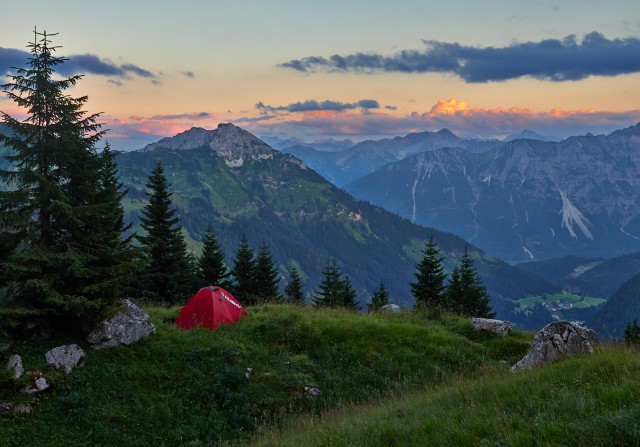Get the weekly SPARTANAT newsletter.
Your bonus: the free E-Book from SPARTANAT.

Survival knowledge: Camping in the mountains?
Spring is here, and what could be more beautiful than camping alone on a mountain top, or romantically, or even strategically in the middle of the forest: That is our dream of "pure nature", freedom, and adventure. And because we are constantly asked if and how this is possible, here is our answer: It remains a dream. At least in Austria, camping outside of designated campsites is almost everywhere prohibited.
Let's start below the tree line, because there the law is quite clear: Camping in the forest is prohibited by law throughout Austria. Yes, we are allowed to freely enter the forest (§ 33 of the Forestry Law), which is already a privilege compared to some other countries. But camping is not allowed, unless there is an explicit consent of the landowner.
Alright, let's go hopefully one floor up - to the "alpine wasteland". And there we have better chances, because the regulations vary significantly from state to state. According to the Alpine Club, "alpine bivouacking", which is unplanned emergency bivouacking that individuals are forced into in case of injury, bad weather, or darkness, is tolerated. However, intentional bivouacking is equated with camping, warn the experts at the Alpine Club. Violations can result in fines of up to 14,500 euros depending on the state.
An overview of regulations by Austrian states:
- Burgenland
Less restrictive. Camping in the Burgenland "open country" is allowed. The only restriction, according to the Burgenland Camping and Mobile Home Site Act (1982), applies to groups of more than ten people and stays longer than three days.
- Carinthia
Very restrictive. The Carinthian Nature Conservation Act (2002) prohibits camping in the open landscape outside of officially approved campsites. The only exception is alpine bivouacking.
- Lower Austria
Very restrictive. The Lower Austrian Nature Conservation Act (2000) prohibits setting up and staying in mobile homes (including tents) in grasslands outside of approved campsites.
- Upper Austria
Less restrictive. According to the Upper Austrian Tourism Act (1990), the alpine wasteland above the tree line (and outside of pasture areas) is "open for pedestrian traffic". For the sake of mutual tolerance, camping and overnight stays are included here.
- Salzburg
Less restrictive, but diverse. Laws to be considered here are the Salzburg Camping Act (2005), the Salzburg Mountain Freedom Act (1920), and the Salzburg Nature Conservation Act (1999). While camping in the high mountains is not generally prohibited, the corresponding sensitivity in dealing with nature is assumed. The Alpine Club recommends: Especially groups should contact the nature conservation department of the relevant district administration before their tour.
- Styria
Less restrictive. The key statement from the Styrian Mountain Freedom Act (1922): "The wasteland above the tree line, with the exception of areas not used for pasture (alms), is open to tourist traffic and can be entered by anyone". The term "enter" is here broadened compared to the Forestry Law, and camping is also possible in the wasteland with regard to mutual tolerance.
- Tyrol
Very restrictive. The Tyrolean Camping Act (2001) clearly states: "Camping outside of camping sites is prohibited". The only exception is alpine bivouacking "during a short period necessitated by the occasion".
- Vorarlberg
Less restrictive. The Law on the Construction and Maintenance of Public Roads and Mountain Freedom (1969) does not explicitly authorize "camping", but it allows for camping and alpine bivouacking. According to § 14 (1) of the Vorarlberg Camping Site Act, the mayor of a municipality can prohibit the setting up of tents outside approved camping sites.
Good tip: Consent of the landowner - if available - is also advisable above the tree line!
Camping in Protected Areas
Even though they are often the most scenic areas: Camping is taboo in protected areas. The strictest rules apply in national parks, nature reserves, and special protection areas, so it is strongly recommended to inform yourself about existing regulations before a tour.
Source and further information on "Mountain Freedom": www.alpenverein.at/portal/natur-umwelt/
SPARTANAT is the online magazine for Military News, Tactical Life, Gear & Reviews.
Send us your news: [email protected]
Ad
similar
Get the weekly SPARTANAT newsletter.
Your bonus: the free E-Book from SPARTANAT.


